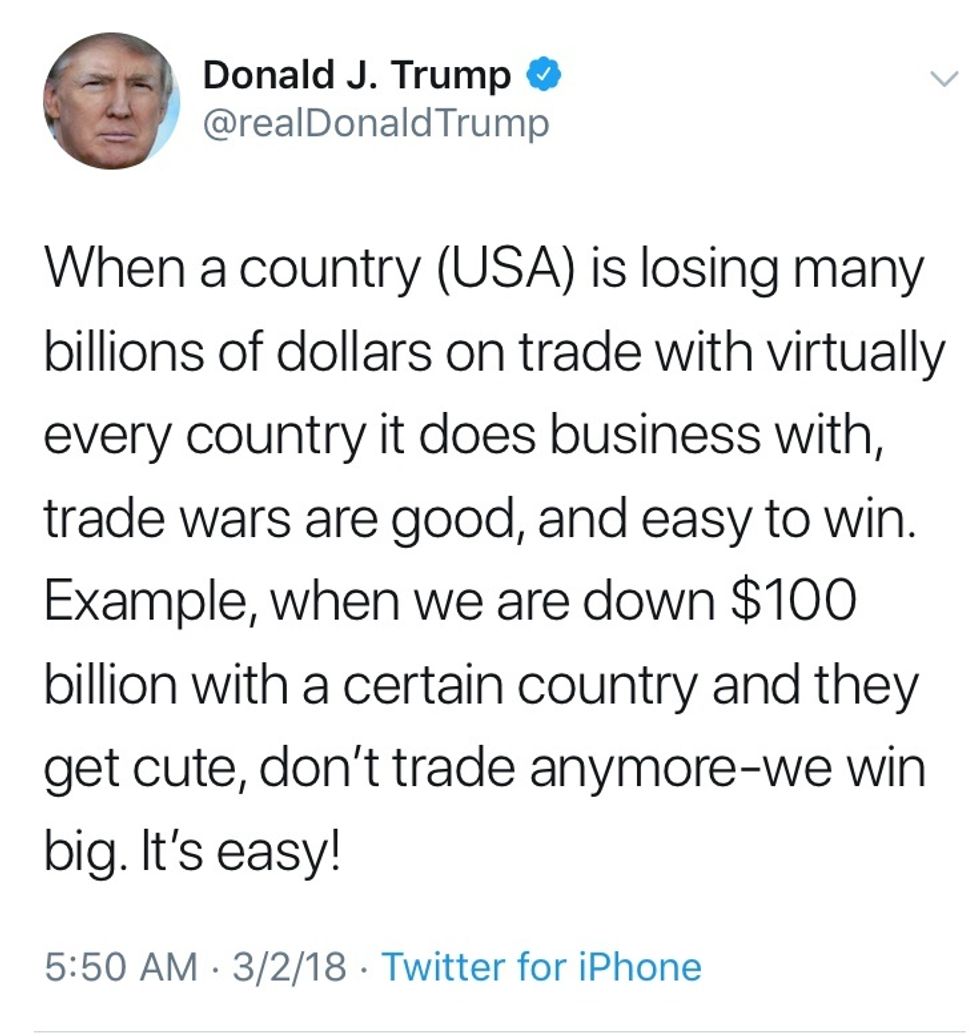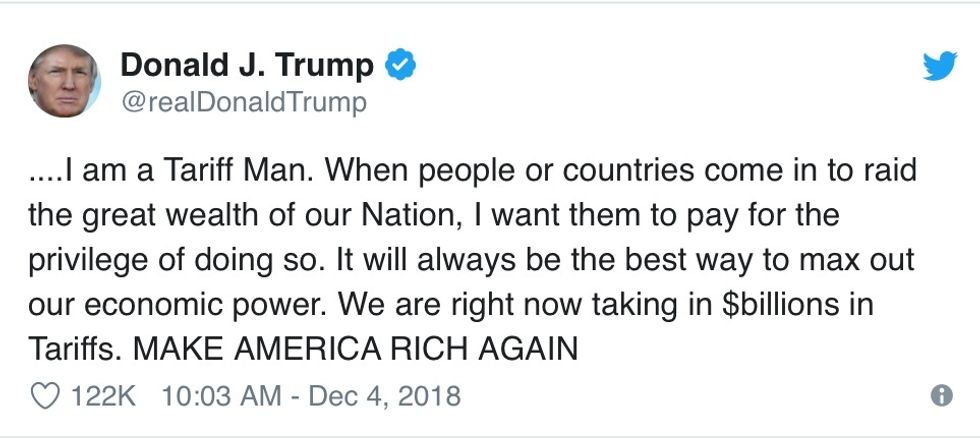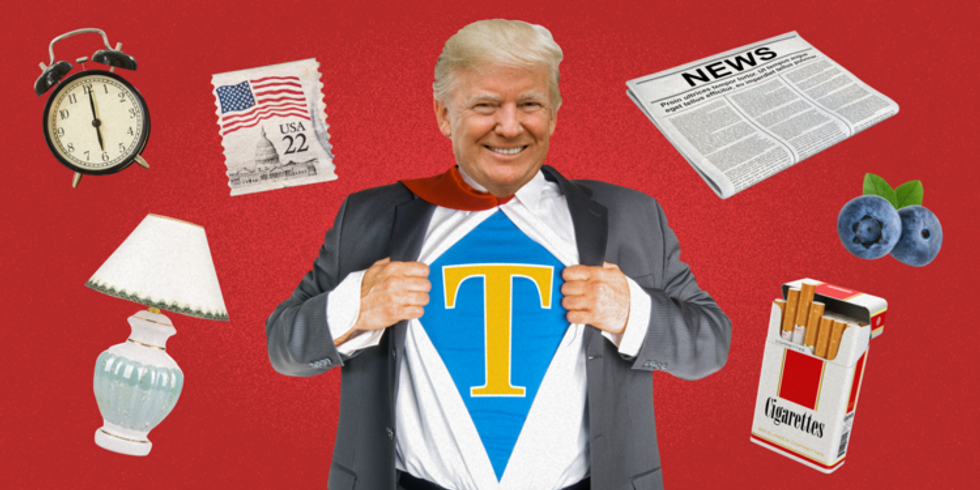At best, Trade Wars are complicated. Not so for Donald Trump.

“Good and easy to win!" - so the man with no knowledge of history or economics proclaimed.
Trump sees Trade Wars as part of his imagined unlimited power as President, part of his imagined right to bully the whole world in our name.
In December after China began to retaliate against Trump's casually imposed tariffs, Trump dug further in, as he always does, and made Trade Wars part of his identity.

“Tariff Man, “ he declared- one of the many ignominious ways history will remember him.

In December, in an Atlantic article, entitled "Does Trump Even Understand How Tariffs Work?," Annie Lowrey commented, “It's unclear what the president wants to accomplish with his trade war."
Yes, he wants to impress his base, other countries and himself with his power, but his economic goals for the nation, if they exist, are unclear. The collateral as well as direct damage that has resulted from Trade Wars is already clear, though, as ever, the collateral damage he causes is irrelevant to him.
The fall out from this Trumpian braggadocio has been painful in both countries. According to Reuters, by November, "American soybean sales to China — the world's largest importer of soybeans — have plunged by 94 percent from last year's harvest. The U.S. and Chinese economies each lose about $2.9 billion annually due to Beijing's tariffs on soybeans, corn, wheat and sorghum alone, said Purdue University agricultural economist Wally Tyner.
"It's something that's crying for a resolution," Tyner said. "It's a lose-lose for both the United States and China."
“The program's limitations are beginning to test farmers' patience. The trade war shows no signs of easing, with China and the United States locked in a stalemate that has reduced American farmers' access to a critical market for soybeans, farm equipment and other products.
The $12 billion bailout program Trump announced with great fanfare in July to "make it up" to farmers has done little, resulting in few payouts so far.
According to the Department of Agriculture itself, $838 million has been paid out to farmers since the first $6 billion pot of money was made available in September. The government is unlikely to offer additional money beyond the $12 billion, according to Sonny Perdue, the agriculture secretary." (source Reuters, Nov. 19).
After a dinner at the beginning of December in Buenos Aires with Chinese President Xi Jinping, Trump announced that they had reached an "incredible deal" to temporarily suspend his Trade War. January 1 then was the start of the proclaimed 90-day Trade War truce period - a time for talks between China and the United States to formulate a new trade agreement.
But the truce has not provided the desired reprieve to our farmers. Instead, the Trump shutdown has further deteriorated their situation.
A Reuters report on December 28 noted, "Commodity traders are in the dark because of the partial U.S. government shutdown, unable to see daily and weekly reports of agricultural exports to obtain clues as to whether China is following through with promises to buy grain and soy amid the ongoing trade war."
In that same report, “Traders have been anxiously awaiting proof from the U.S. Department of Agriculture that China is ramping up purchases of grains and soy from U.S. farmers, who are preparing their spring planting and trying to secure financing for seeds, fertilizer and land rents." A report on January 3 noted, “The shutdown has blocked assistance for many farmers, who at this time of year apply for federal loans as they pay bills due from the previous year and begin budgeting for next season's planting. It is also affecting aid payments promised to allay the effects of the trade war." Further, the deadline to apply for the aid is Jan. 15, yet the FSA offices where farmers must submit their applications have been shuttered since Dec. 28.
To date, thanks to Trump's Trade War, American farmers have found themselves shut out of foreign markets, hit with retaliatory tariffs, unable to manage the financing they need for survival, and, finally, even replaced by alternative soy producers.
Since imposing a 25 percent tariff on American soybeans in July in response to U.S. tariffs on Chinese goods, China was initially buying soy from Brazil. The surge in demand pushed Brazilian soy premiums to a record over U.S. soy futures in Chicago, as The Trade War reduced sales for U.S. exporters and increased costs for Chinese importers.
By May, Bloomberg announced that China almost tripled its purchases from Russia.
Then on January 5th, something even more astonishing happened.
Reuters reported that Russian President Vladimir Putin said on Wednesday [November 28, 2019] at the Russia Calling annual investment forum that Russia would hereafter supply soy beans [and poultry meat] to China and that “the United States had effectively given up on that market."
This speech by Putin was not widely covered.
Trump, who had broad support in many farm states and rural areas, insists that his approach to trade will ultimately help American farmers.
The depreciated ruble, the strong dollar, Trump's commitment to a US-Sino Trade War and Russia's determination, announced by Putin, to replace our soy exports with their own, though, may tell another story.
Absent a new American-Chinese agreement when the Trade War cease fire ends on March 1, Trump tariffs against China now set at 10 per cent are to raise to 25 per cent.
Is Russia now to be the biggest beneficiary of Trump's Trade War with China? Is this an accident?
Or - and this is almost too painful to speculate about - is Trump's USA- Sino Trade Wars further proof that Trump is #PutinsPuppet? Is even Trump's Trade War being fought in service of another Master?
Trump's recurrent and bizarre support of Putin and of Russia - most recently his unsolicited citation of little-known Russia talking points to justify Russia's invasion of Afghanistan - lead us to what once would have been an unthinkable speculation about an occupant of the White House.
###
January 7, 2019
Post Script. This is my overview of the damage Trump's Trade Wars have done to our soy farmers and a speculation on what might really be happening. Maybe so. Maybe not. All terrible.#PutinsPuppet

